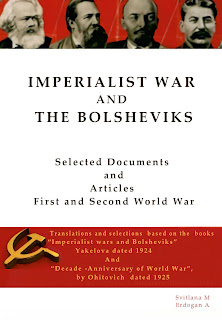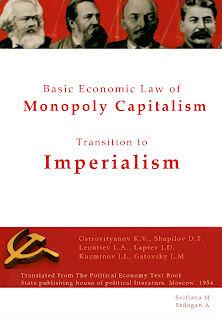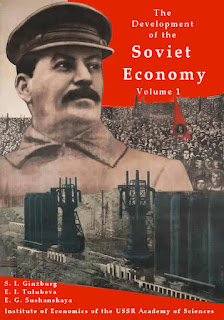World Economy and Proletarian Socialism
N.I. Bukharin: Imperialism and World Economy -preface and index
The first period of the war has brought about, not a crisis of capitalism (the germs of which were visible only to the most penetrating minds of both the bourgeois and proletarian camps), but a collapse of the "Socialist" International. This phenomenon, which many have attempted to explain by proceeding solely from the analysis of the internal relations in every country, cannot be more or less satisfactorily explained from this angle. For the collapse of the proletarian movement is a result of the unequal situation of the "state capitalist trusts" within the boundaries of world economy. Just as it is impossible to understand modern capitalism and its imperialist policy without analysing the tendencies of world capitalism, so the basic tendencies in the proletarian movement cannot be understood without analysing world capitalism.
The first period of the war has brought about, not a crisis of capitalism (the germs of which were visible only to the most penetrating minds of both the bourgeois and proletarian camps), but a collapse of the "Socialist" International. This phenomenon, which many have attempted to explain by proceeding solely from the analysis of the internal relations in every country, cannot be more or less satisfactorily explained from this angle. For the collapse of the proletarian movement is a result of the unequal situation of the "state capitalist trusts" within the boundaries of world economy. Just as it is impossible to understand modern capitalism and its imperialist policy without analysing the tendencies of world capitalism, so the basic tendencies in the proletarian movement cannot be understood without analysing world capitalism.
Capital implies the existence of labour. Labour implies the existence of capital. The capitalist mode of production is a certain relation between people, between social classes, each of which implies the existence of the other. Viewed from this angle, both capitalists and workers are members, component parts, poles of the same capitalist society. In so far as capitalist society exists, there exists also an interdependence of these opposing classes, a mutual dependence, expressing itself in a relative solidarity of interests that are opposed in substance. This "solidarity" of interests is the solidarity of a moment, it is not that lasting solidarity which welds together the members of the same class. Bourgeois political economy, and together with it its "Socialist" followers, present that which is passing, momentary, accidental for the class struggle on a social scale as essential; they do not see the trees for the forest, and they inevitably sink to the rôle of simple satellites of finance capital.
Here is an example. Everybody knows that at the beginning of the capitalist era, when the working class had just begun to emerge and to separate itself from the small entrepreneurs, when so-called patriarchal relations prevailed between master and worker, the latter to a considerable degree identified his interests with the interests of his exploiter.
This identification of interests that are in substance totally opposed to one another, was, to be sure, not suspended in the air. It had a very real basis. "The better the business of our shop, the better for me," the worker of that time used to reason. This reasoning was based on the possibility of raising wages with the increase of the sum total of values realised by a given enterprise.
We find the same psychology in other variations. What, in fact, is, let us say, the so-called "craft ideology" of the English trade unionists? We find here substantially the same idea: our production, they say, our sphere of production, which embraces both workers and industrialists, must prosper before anything else. No interference of outside elements must be tolerated.
In recent times we find an analogy to this purely local patriotism in enterprises with highly skilled labour. Such enterprises, for instance, are the plants of the well-known American pacifist (and, incidentally, war contractor) Ford. The workers are carefully selected for the plant. They receive higher wages, they are granted various premiums and profit sharing under the condition that they be bound to the plant. As a result, the bamboozled workers are "devoted" to their masters.
On a larger scale the same phenomenon may be observed in the so-called working class protectionism with its policy of safeguarding "national industry," "national labour," etc. This ideology permeates a considerable part of the Australian and American workers: "We" (i.e., both capitalists and workers), they say, are equally interested in our national industry, for, the higher the profits of our employers, the higher will our wages rise.
In the process of competitive struggle between the various enterprises, their situation is not everywhere the same. Enterprises with highly skilled labour always occupy the first ranks, always enjoy exceptional privileges. Their share in the surplus value that is being produced in society as a whole is disproportionately large, for they receive differential profits on the one hand, cartel rents (as far as we deal with modern times) on the other. Thus a basis is created for a momentary interlinking of the interests of capital and labour in a given production branch, a circumstance which expresses itself in the workers giving capital, not the labour of duty, but the labour of love.
It is perfectly obvious that such a "solidarity of interests" between the capitalist and the worker is of a temporary character, and (from the point of view of what "ought to be") it cannot determine the conduct of the proletariat. Were the workers eternally to hang on to the coat tails of their masters, they would never be able to conduct a single strike, and the employers, bribing them individually, would be able individually to defeat them.
However, because the proletariat has not learned yet to distinguish local and temporary interests from general and lasting ones, it is permeated with such a narrow conception. The latter is overcome only when the class struggle achieves great scope, destroying local bigotry, welding the workers together, and throwing them into sharp opposition as a class to the class of the capitalists. In this way the psychology of the patriarchal period was overcome when the bond of unity between the workers and the master of an individual enterprise was severed. In this way the "craft ideology" of the unions organising skilled workers was overcome.
However, the end of the nineteenth century, which to a large degree destroyed the bond of unity between capitalists and workers, which placed against each other those classes and their organisations as classes and organisations hostile to each other in principle, has not yet destroyed the bond of unity between the working class and the greatest organisation of the bourgeoisie, the capitalist state.
The working class connection with this organisation was expressed in the ideology of workers' patriotism ("social-patriotism"), in the idea of a "fatherland," which the working class is supposed to serve.
After what has been presented above, the material basis of this phenomenon will become clear if we turn our attention to the whole sphere of world economy.
We have seen that the competitive struggle was, by the end of the nineteenth and the beginning of the twentieth century, to a large extent transferred to the foreign markets, i.e., it became a competition in the world market. Thus the state organisation of capital, the "fatherland," having turned into a state capitalist trust, took the place of the individual enterprise and appeared on the world arena with all its heavy and ponderous apparatus.
From this angle we must first of all view the colonial policy of the imperialist states.
There is an opinion current among many moderate internationalists to the effect that the colonial policy brings nothing but harm to the working class and that therefore it must be rejected. Hence the natural desire to prove that colonies yield no profit at all, that they represent a liability even from the point of view of the bourgeoisie, etc. Such a point of view is being propounded, for instance, by Kautsky.
The theory unfortunately suffers from one shortcoming, namely, it is out and out incorrect. The colonial policy yields a colossal income to the great powers, i.e., to their ruling classes, to the "state capitalist trust." This is why the bourgeoisie pursues a colonial policy. This being the case, there is a possibility for raising the workers' wages at the expense of the exploited colonial savages and conquered peoples.
Such are exactly the results of the great powers' colonial policy. The bill for this policy is paid, not by the continental workers, and not by the workers of England, but by the little peoples of the colonies. It is in the colonies that all the blood and the filth, all the horror and the shame of capitalism, all the cynicism, greed and bestiality of modern democracy are concentrated. The European workers, considered from the point of view of the moment, are the winners, because they receive increments to their wages due to "industrial prosperity."
All the relative "prosperity" of the European-American industry was conditioned by nothing but the fact that a safety valve was opened in the form of colonial policy. In this way the exploitation of "third persons" (pre-capitalist producers) and colonial labour led to a rise in the wages of the European and American workers.
One highly important circumstance must here be noted: in their struggle for colonies, for sales markets, and markets for raw materials, for capital investment spheres, for cheap labour, not all the "state capitalist trusts" achieve an equal success. While England, Germany and the United States of America forged ahead in their triumphal march over the world market, Russia and Italy, all the strenuous efforts of the imperialists notwithstanding, proved too weak. It was in this way that a few great imperialist powers came to the forefront as pretenders to world monopoly. They have proved, as far as the others are concerned, "above competition."
Economically the situation is this. World surplus value is being divided in the struggle for the world market. As is the case within the framework of "national economy," so also within the boundaries of world economy, the stronger competitor (whose strength is increased by multifarious factors, like the structure of production, the strength of the state militarist apparatus, convenient location due to the presence of "natural monopolies," etc.) receives super-profits, a kind of differential profit (due to the superior structure of production) and a kind of cartel rent (due to the pressure of the militarist apparatus that fortifies monopolies).
Super-profits obtained by the imperialist state are accompanied by a rise in the wages of the respective strata of the working class, primarily the skilled workers.
Such a phenomenon could also be observed in olden times. It was pointed out by Friedrich Engels who referred to the monopoly situation of England in the world market and to the conservatism of the English proletariat that resulted therefrom.
It was on the basis of this relative interest of the proletariat in colonial plunders that its connection with the masters' organisation of the bourgeois imperialist state grew and became strong. In Socialist literature this psychology found expression in the "national" point of view of the Social-Democratic opportunists. This "national wisdom," emphasised on every occasion, signified a complete abandonment of the point of view of revolutionary Marxism.
Marx and Engels viewed the state as an organisation of the ruling class that crushes the oppressed class with blood and iron. They assumed that future society would have no state at all, for the simple reason that there would be no classes. It is true that, for the transition period of proletarian dictatorship, when the proletariat is the temporary ruling class, they most correctly demanded a strong apparatus of working class state power to keep the overthrown classes in leash. Still, their attitude towards the oppressing state apparatus of the bourgeoisie was that of furious hatred, and from this point of view they mercilessly criticised the Lassalleans and other "statesmen." And a connection undoubtedly exists between this revolutionary point of view and the well-known thesis of the Communist Manifesto that the workers have no fatherland.
The Socialist epigones of Marxism have relegated this revolutionary opposition of Marx and Engels to the archives. In its place there emerge the theories of "true patriotism" and "truestatesmanship," which, however, are in no way distinguishable from the most ordinary patriotism and the most ordinary statesmanship of the ruling bourgeoisie. Such an ideology was an organic outgrowth of the proletariat's partaking in the "great-nation policy" of the state capitalist trusts.
No wonder if after the outbreak of the great war, the working class of the foremost capitalist countries, chained to the chariot of the bourgeois state power, came to the aid of the latter. The proletariat was prepared for this by the whole preceding development; it was brought to this by its connection with the state organisation of finance capital.
However, the war itself, which could be waged only because the proletariat gave its tacit consent or showed insufficient indignation, has proven to it that its share in the imperialist policy is nothing compared with the wounds inflicted by the war.
It is in this way that there comes the crisis of imperialism and the rebirth of proletarian Socialism. Imperialism has turned its true face to the working class of Europe. Hitherto its barbarous, destructive, wasteful activities were almost entirely confined to the savages; now it thrusts itself upon the toilers of Europe with all the horrifying impact of a bloodthirsty elemental power let loose. The additional pennies received by the European workers from the colonial policy of imperialism-what do they count compared to millions of butchered workers, to billions devoured by the war, to the monstrous pressure of brazen militarism, to the vandalism of plundered productive forces, to high cost of living and starvation!
The war severs the last chain that binds the workers to the masters, their slavish submission to the imperialist state. The last limitation of the proletariat's philosophy is being overcome: its clinging to the narrowness of the national state, its patriotism. The interests of the moment, the temporary advantage accruing to it from the imperialist robberies and from its connections with the imperialist state, become of secondary importance compared with the lasting and general interests of the class as a whole, with the idea of a social revolution of the international proletariat which overthrows the dictatorship of finance capital with an armed hand, destroys its state apparatus and builds up a new power, a power of the workers against the bourgeoisie. In place of the idea of defending or extending the boundaries of the bourgeois state that bind the productive forces of world economy hand and foot, this power advances the slogan of abolishing state boundaries and merging all the peoples into one Socialist family. In this way the proletariat, after painful searching, succeeds in grasping its true interests that lead it through revolution to Socialism.
Conclusion
Conclusion




























.jpg)




